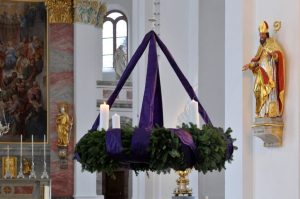Archive, Articles
Life by Hope
A column in the Advent issue of St Olav Kirkeblad 2024
Current instability worldwide terrifies. The UN Climate Change Conference in Baku began with a call to action no major agent will heed. The US presidential election generates perplexity at many levels. In Ukraine the war of invasion rages on, while we have long since turned our minds to other things. Russian pretensions sneakingly prevail. In Germany a vulnerable coalition has collapsed. France was barely able to scrape a government together to host the Olympics. In London, it’s a full-time job to move PMs in and out of 10 Downing Street. The crisis in the Middle East escalates.
And we are about to light the first candle on our Advent wreath: ‘Today we light the first of four, here to stand alone. We await the infant who, in the manger, was laid on straw.’
What on earth does it mean to perform such an action in a world such as ours?
The first thing we must say is that today’s world isn’t all that unlike the world into which the Father’s eternal Word was born. That world, too, was coming apart.
The first thing we must say is that today’s world isn’t all that unlike the world into which the Father’s eternal Word was born. That world, too, was coming apart. The growth of the Church coincided with the collapse of political structures. Massive migrations, coming from the East, redefined the West, giving birth to ‘Europe’. The soil in which the Gospel’s seed was sown was no peaceful, symmetrically ploughed field. No, the seed was practically thrown into an earthquake. Thus it became constitutional to the new landscape that emerged, free of established expectation. The Church, Christ’s Bride, turned out to be a creative element in a new societal order which in time produced Christian civilisation, one of man’s noblest accomplishments.
How did it come about? It came about because Christians took seriously the call to become new women and men. A Christian’s existence unfolds in the world, but is not of the world. It represents a new humanity set to elevate society. When the Lord, in the Gospel, uses the image of the leaven in the dough, it is with serious intent. Remember what Paul wrote to the Philippians: ‘Do all things without grumbling or questioning, that you may be blameless and innocent, children of God without blemish in the midst of a crooked and perverse generation, among whom you shine as lights in the world, holding fast the word of life’ (2.14-16). Indeed, we do live in a ‘perverse’ generation, a generation that has slid off track. Much in it is ‘crooked’, twisted out of shape, struggling to pursue the natural, blessed order that corresponds to God’s creative purpose. In this setting we are to hold fast to ‘the word of life’.
Surrounded by metaphysical and moral darkness, we Christians are to be light, not in the sense that we glimmer self-generatedly, but in as much as Christ shines in us.
Surrounded by metaphysical and moral darkness, we Christians are to be light, not in the sense that we glimmer self-generatedly, but in as much as Christ shines in us, in as much as our lives are grounded and nurtured in Christ. Baptised to become God’s children, incorporated into Christ’s mystical Body, we have received great grace. That should be perceptible, clear in the choices we make. We are not to drift along with a crookedly running current.
In recent debate, the question has been asked: What can we fairly expect of ourselves and each other as Christians? Honesty is needed here; hypocrisy is to be unmasked. And yet, we must not forget that Christian life is a high task; and that grace enables us to act in ways that transcend merely human capability. God became man to renew our nature from within. The call he addresses to us is immense. The Gospel cannot be reduced to a banal, ‘I’m OK, You’re OK’. When it is, it ceases to be Gospel. It becomes, then, just a means to self-deception.
The Gospel cannot be reduced to a banal, ‘I’m OK, You’re OK’. When it is, it ceases to be Gospel. It becomes, then, just a means to self-deception.
We stand on the threshold of a jubilee launched under the motto Peregrinantes in spem. Hope, spes, is in the Accusative. It is a goal to which we pilgrims, peregrinantes, move, called out of petrification into conversion. The Church exhorts us to shed passive resignation, be it self-satisfied or anguished; to place our trust in the Lord of the world who from the dawn of time till the end of history makes all things new. If we follow that call fully, we may by grace carry luminous hope into a world that has forgotten the meaning of the very word.
Everything is possible then. The no destruction is inevitable.
We call ourselves disciples of Jesus, members of his Body. ‘He who says he abides in him ought to walk in the same way in which he walked’ (1 John 2.6). To construct a life on these terms, certain that for God nothing is impossible, is to walk trustfully into hope. Let us encourage one another as we advance along this path. We all owe one another a good example.

